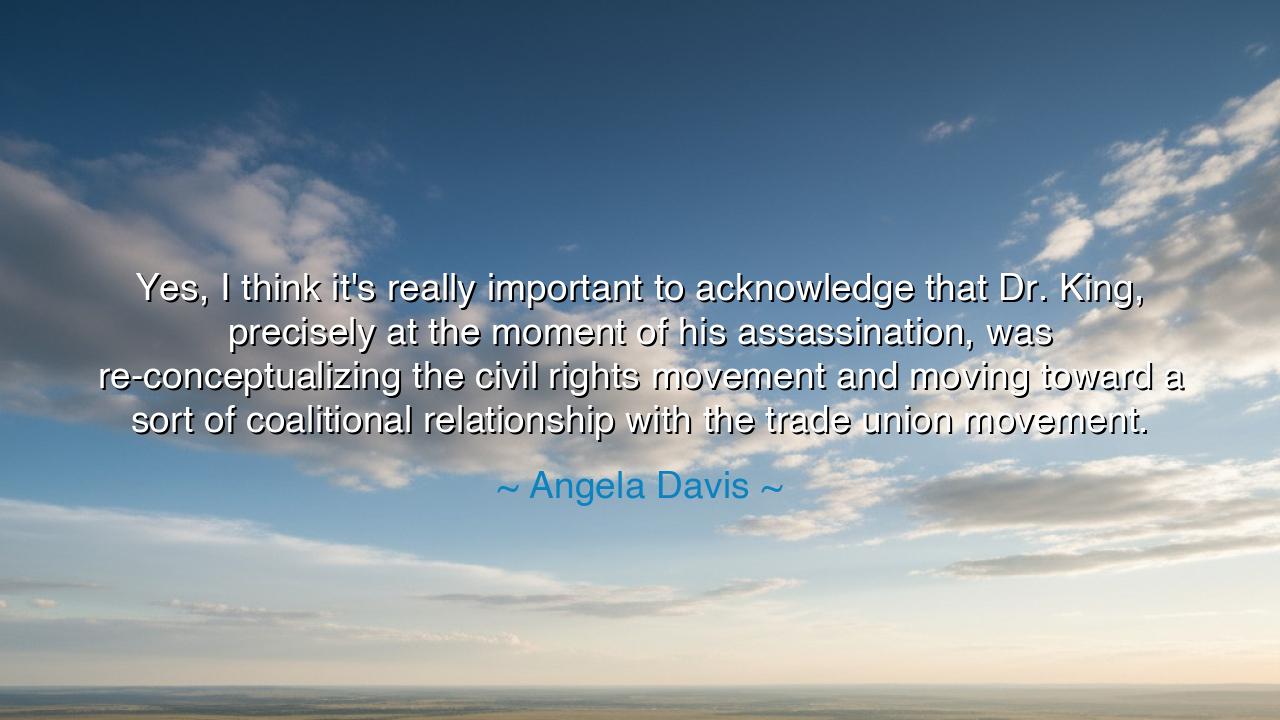
Yes, I think it's really important to acknowledge that Dr. King
Yes, I think it's really important to acknowledge that Dr. King, precisely at the moment of his assassination, was re-conceptualizing the civil rights movement and moving toward a sort of coalitional relationship with the trade union movement.






When Angela Davis declares, “Yes, I think it’s really important to acknowledge that Dr. King, precisely at the moment of his assassination, was re-conceptualizing the civil rights movement and moving toward a sort of coalitional relationship with the trade union movement,” she speaks with the voice of remembrance and warning. Her words remind us that the vision of Dr. King did not end with desegregation, but was widening, deepening, and growing more radical in its final days. His dream was not only for racial justice, but for the liberation of all workers, the poor, and the oppressed.
The origin of this wisdom lies in the closing chapter of King’s life, when he turned his eyes from the victories of civil rights legislation to the harder struggle of economic justice. He stood with sanitation workers in Memphis, aligning the power of the civil rights movement with the strength of the trade unions. In that unity, King saw a new horizon: a coalition of Black, white, and working people, joined in the fight against poverty, exploitation, and inequality. Davis, a scholar and activist herself, calls us to remember this unfulfilled trajectory.
To recognize this coalitional relationship is to see that freedom cannot be partial. Political equality without economic security leaves the soul still bound. King understood that true justice required challenging not only racism but also the structures of labor and wealth. This vision was dangerous, for it threatened the pillars of power, and it was at this moment of expansion — when the struggle grew broader — that he was silenced by death.
Davis’s words are thus a lament and a summons. They mourn the loss of a leader whose vision was cut short, but they also remind us that the path he set his feet upon is not abandoned. The unity of movements — of civil rights and labor, of racial justice and economic justice — remains the unfinished work of our time.
Let the generations to come remember: the legacy of Dr. King is not confined to what was achieved in his lifetime, but also to the dream he carried into his final days. Angela Davis’s reminder is a torch, urging us to see that liberation is not singular but collective, and that only through coalitions of the oppressed can the world be remade in justice.






AAAnna Anna
I think Angela Davis makes an important point about Dr. King's evolving vision. His move toward connecting the civil rights and labor movements shows his ability to adapt and build bridges between different groups. Do you think this coalitional approach would have been more successful in the long term? How might it have influenced the political landscape in terms of worker rights and racial justice if Dr. King had lived longer?
NKNguyen khang
This quote by Angela Davis reminds me of the power of coalition-building in movements for change. Dr. King's willingness to connect with the trade union movement shows a deep understanding of how economic justice is tied to racial justice. But, how might his death have affected the trajectory of these coalitions? Were there missed opportunities for even broader alliances between different social justice movements at that time?
NThuong nguyen thu
Angela Davis brings an important point into focus, showing how Dr. King was evolving in his approach right before his death. His attempt to merge the civil rights movement with the labor movement feels like an underexplored chapter in history. What kind of impact do you think this re-conceptualization would have had on future activism, especially considering the economic justice aspect of his work?
TVDuong Thi Van
I never fully appreciated how Dr. King was shifting his strategy at the time of his assassination. His willingness to broaden the civil rights movement to include labor rights seems so forward-thinking. How would the dynamic between civil rights and labor unions have changed if he had successfully forged this coalition? Would this have been the next step toward even more significant change in the fight for equality?
FFu
Angela Davis's statement about Dr. King's evolving approach to the civil rights movement is powerful. It makes me think about how much the movement could have grown had he had more time to fully explore his ideas on coalitions with the trade union movement. How might this shift in focus have affected both civil rights and labor rights movements? Could this have led to a stronger, more unified push for social justice?